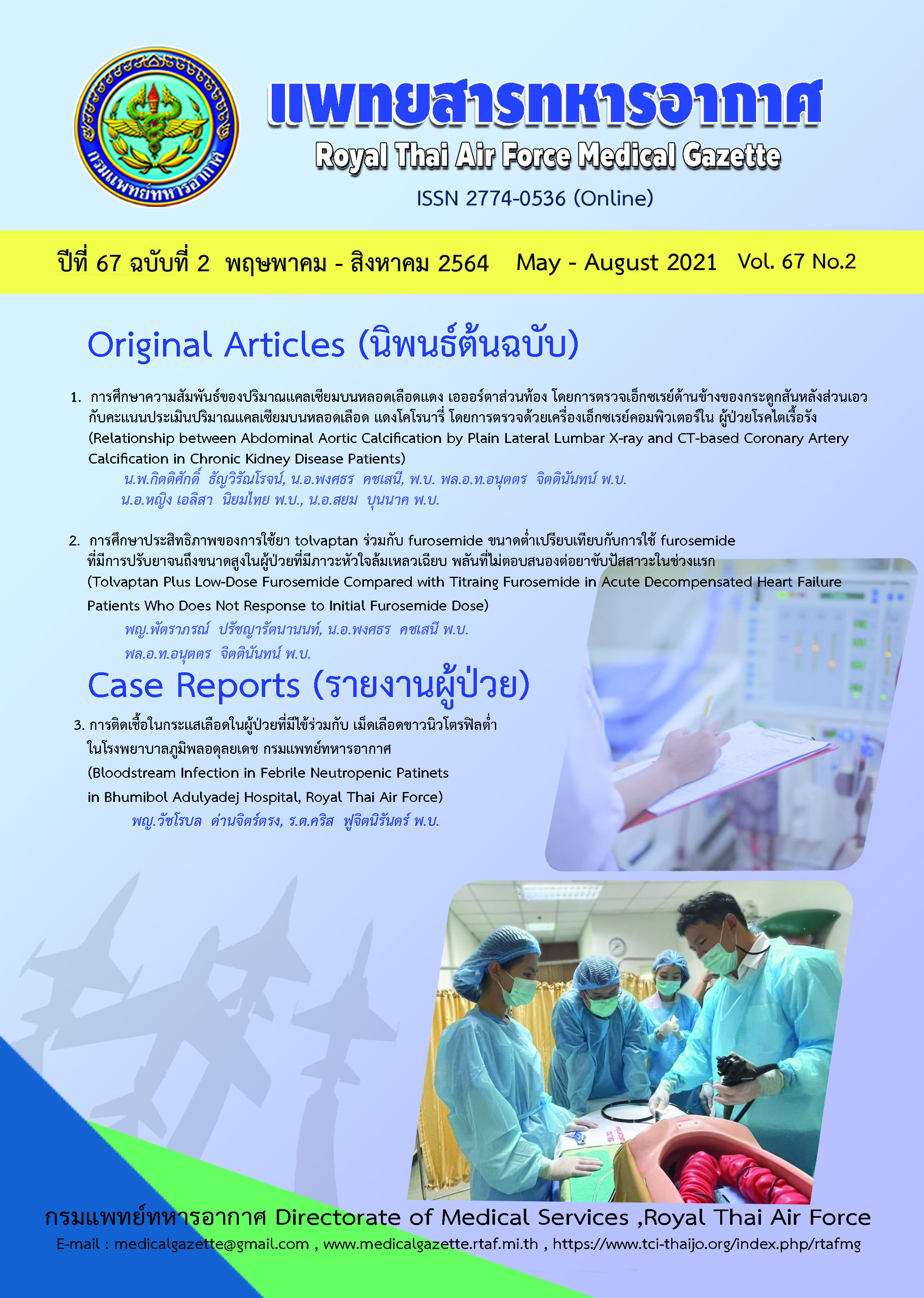Tolvaptan Plus Low-Dose Furosemide Compared with Titraing Furosemide in Acute Decompensated Heart Failure Patients Who Does Not Response to Initial Furosemide Dose
Main Article Content
Abstract
Background : Acute decompensated heart failure (ADHF) is common and associated with poor prognosis. Furosemide is a natriuretic that frequently used as initial diuretic therapy in these patients. However, it is associated with neuro-hormonal activation, worsening renal insufficiency, and electrolyte abnormalities. Tolvaptan, a specific V2 receptor antagonist, effectively increase free water excretion without significant neuro-hormonal activation. To date, few data have demonstrated the benefit of combination therapy comprising tolvaptan and low-dose furosemide compared with conventional furosemide therapy in ADHF patients.
Methods : An open-labelled, randomized controlled trial enrolled patients with ADHF who does not response to initial 40 mg. intravenous furosemide (urine output < 1 L./day or < 250 mL./6 hrs.) at Bhumibol Adulyadej Hospital Patients were randomized to receive tolvaptan starting at 7.5 mg./day plus fixed dose IV furosemide (40 mg./day) or titrating dose IV furosemide (start with 80 mg./day) for 96 hours. During study period, doses of diuretic from both groups could be increased (as standard protocol) to achieve diuretic efficiency target. The primary outcome was mean changes in body weight at 72 hrs. Secondary outcomes included daily urine output, daily changes in serum creatinine, sodium, potassium and worsening renal function.
Results : Fifty-two patients (68.1+14.3 years, 58 % men, ejection fraction 37.9+18.0 %) were randomized to tolvaptan + low-dose furosemide or titrating furosemide. At 72 h., weight loss (3.2+2.25 vs. 2.31+2.2 kg., p=0.165) was numerical greater in the tolvaptan + low-dose furosemide group have demonstrated a significant greater urine output during the first 24 hrs. (p=0.022). For serum sodium, tolvaptan + low-dose furosemide had a significant increase in serum sodium throughout the study period (+3.8+5.2 vs +1.2+4.0 mmol./l., p=0.047). In terms of safety outcomes, tolvaptan + low-dose furosemide and titrating furosemide had shown a similar efficacy during the first 72 hrs. Tolvaptan + low-dose furosemide has shown a trend towards less renal function decline during study period.
Article Details

This work is licensed under a Creative Commons Attribution-NonCommercial-NoDerivatives 4.0 International License.
บทความที่ได้รับการตีพิมพฺเป็นลิขสิทธิ์ของวารสาร
References
Felker GM, O’Connor CM, Braunwald E. Loopdiuretics in acute decompensated heart failure: necessary? Evil? A
necessary evil? Circ Heart Fail 2009;2:56–62.
Metra M, Nodari S, Parrinello G, Bordonali T, Bugatti S, Danesi R, et al. Worsening renal function in patients
hospitalised for acute heart failure: clinical implications and prognostic significance. Eur J Heart Fail 2008;10:188–
Damman K, Valente MA, Voors AA, O’Connor CM, van Veldhuisen DJ, Hillege HL. Renal impairment, worsening
renal function, and outcome in patients with heart failure: an updated meta-analysis. Eur Heart J 2014;35:455–69.
Shirakabe A, Hata N, Yamamoto M, Kobayashi N, Shinada T, Tomita K, et al. Immediate administration of
tolvaptan prevents the exacerbation of acute kidney injury and improves the mid-term prognosis of patients with
severely decompensated acute heart failure. Circ J 2014;78:911–21.
Gheorghiade M, Konstam MA, Burnett JC Jr., Grinfeld L, Maggioni AP, Swedberg K, et al. Short-term clinical
effects of tolvaptan, an oral vasopressin antagonist, in patients hospitalized for heart failure: the EVEREST Clinical
Status Trials. JAMA 2007;297:1332–43.
Pang PS, Konstam MA, Krasa HB, Swedberg K, Zannad F, Blair JE, et al. Effects of tolvaptan on dyspnoea relief from the EVEREST trials. Eur Heart J 2009;30:2233–40.
Kimura K, Momose T, Hasegawa T, Morita T, Misawa T, Motoki H, et al. Early administration of tolvaptan
preserves renal function in elderly patients with acute decompensated heart failure. J Cardiol 2016;67:399–405.
Matsue Y, Suzuki M, Seya M, Iwatsuka R, Mizukami A, Nagahori W, et al. Tolvaptan reduces the risk of
worsening renal function in patients with acute decompensated heart failure in high-risk population. J Cardiol
;61:169–74.
Tamaki S, Sato Y, Yamada T, Morita T, Furukawa Y, Iwasaki Y, et al. Tolvaptan reduces the risk of worsening
renal function in patients with acute decompensated heart failure and preserved left ventricular ejection fraction:
Prospective randomized controlled study. Circ J 2017;81(5):740-7.
Schrier RW, Gross P, Gheorghiade M, Berl T, Verbalis JG, Czerwiec FS, et al. Tolvaptan, a selective oral vaso-
pressin V2-receptor antagonist, for hyponatremia. N Engl J Med. 2006;355(20):2099-112.
Gheorghiade M, Niazi I, Ouyang J, Czerwiec F, Kam- bayashi J, Zampino M, et al. Vasopressin V2-receptor
blockade with tolvaptan in patients with chronic heart failure: results from a double-blind, randomized trial.
Circulation 2003;107(21):2690-6.
Shanmugam E, Doss CR, George M, Jena A, Rajaram M, Ramaraj B, et al. Effect of tolvaptan on acute heart
failure with hyponatremia - a randomized, double blind, controlled clinical trial. Indian Heart J. 2016;68(Suppl
:S15-21.
Hauptman PJ, Burnett J, Gheorghiade M, Grinfeld L, Konstam MA, Kostic D, et al. Clinical course of patients with
hyponatremia and decompensated systolic heart failure and the effect of vasopressin receptor antagonism with
tolvaptan. J Card Fail 2013;19:390–7.
Dohi K, Ito M. Novel diuretic strategies for the treatment of heart failure in Japan. Circ J 2014;78:1816–23.
Kidney Disease: Improving Global Outcomes (KDIGO) Acute Kidney Injury Work Group. KDIGO Clinical Practice
Guideline for Acute Kidney Injury. Kidney Int. 2012;Suppl 2:1–138.
Ponikowski P, Voors AA, Anker SD, Bueno H, Falk V. 2016 ESC Guidelines for the diagnosis and treatment of
acute and chronic heart failure. European Heart Journal. 2016;37:2171-2.


